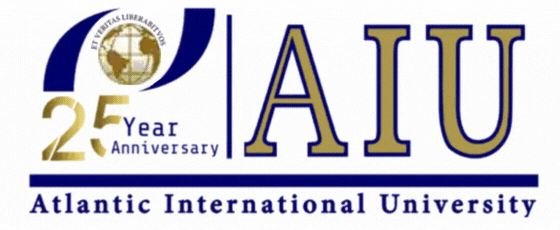- RESEARCHDistance Learning at AIU is enhanced by vast academic resources and innovative technologies build into the Virtual Campus: Hundreds of self-paced courses with video lectures and step by step lessons, thousands of optional assignments, 140,000 e-books, the Social Media & Networking platform allowing collaboration/chat/communications between students, and MYAIU develop students holistically in 11 areas beyond just academics.
- PROGRAMS OFFERED
- Areas of Study
- Courses and Curriculum
- Open Courses
- Register for a Program
- Associate Program
- Associate in Addiction Counseling
- Associate in Agriculture Food And Resources
- Associate in Anti Terrorism Security
- Associate in Behavior Analysis In Special Education
- Associate in Bioethics
- Associate in Climatology
- Associate in Cultural Theological Communication
- Associate in Culinary Arts
- Associate in Ecotechnology
- View all Associates Programs
- Bachelor Program
- Bachelors in Community Development
- Bachelors in Environmental Science
- Bachelor in Education (B.Ed, BS)
- Bachelors in Economics
- Bachelors in Entrepreneurship
- Bachelors in Financial Administration
- Bachelors in Human Resource Management
- Bachelors in Linguistics
- Bachelors in Nutritional Science
- Bachelors in Occupational Health and Safety
- Bachelors in Psychology
- View all Bachelor Programs
- Doctorate Program
- Doctor | of Biology (PhD)
- Doctorate in Business Administration (DBA, PhD)
- Doctor of Economics (PhD)
- Doctor of Electrical Engineering (D.Sc, PhD)
- Doctor of Finance (PhD)
- Doctorate in International Relations
- Doctorate in Information Technology (D.Sc)
- Doctor of Legal Studies (PhD)
- Doctor of Project Management (PhD)
- Doctor of Sociology (PhD, D.Sc)
- Doctorate in Sustainable Natural Resources Management
- View all Doctorate Programs
- Master Program
- Postdoctoral Program
- Postdoctoral in Animal Science
- Postdoctoral in Anti Terrorism Security
- Postdoctoral in Behavior Analysis In Special Education
- Postdoctoral in Bioethics
- Postdoctoral in Blockchain Technology and Digital Currency
- Postdoctoral in Business Management
- Postdoctoral in Cloud Computing
- Postdoctoral in Computer Engineering
- View all Postdoctoral Programs
AIU offers a wide range of majors in areas including the Arts, Business, Science, Technology, Social, and Human studies. More than 120 degrees and programs are available for adult learners at the associate’s, bachelor’s, master’s, doctoral and postdoctoral level. - VIRTUAL CAMPUS
Distance Learning at AIU is enhanced by vast academic resources and innovative technologies build into the Virtual Campus: Hundreds of self-paced courses with video lectures and step by step lessons, thousands of optional assignments, 140,000 e-books, the Social Media & Networking platform allowing collaboration/chat/communications between students, and MYAIU develop students holistically in 11 areas beyond just academics.
- ALUMNI
The world is YOUR campus!”, that is the message of AIU’s month magazine Campus Mundi. Hear the voices and see the faces that make up AIU. Campus Mundi brings the world of AIU to you every months with inspirational stories, news and achievements by AIU members from around the world (students and staff are located in over 200 countries).
Case Studies in applied Economics
Models of Economic Transition in Asia: Successes and Challenges
The document analyzes economic transitions in Asian countries, highlighting successful models in China and Vietnam while noting failures in others like Myanmar. It emphasizes the importance of gradual market openness, private initiatives, and state support in fostering growth, alongside recommendations for overcoming structural challenges to enhance economic development in the region.
Click Here: Get a Guest Access to AIU’s Valuable Resources Now

The document titled “Discover the Big Winners of Models of Transition Peculiarly in some Asian Countries: Case of Studies Applied Economy” provides an in-depth analysis of the economic transitions experienced by various Asian nations, particularly focusing on China, Vietnam, Myanmar, and countries in Central Asia and Indo-Chine Française.
It begins by discussing the gradual evolution of entrepreneurship in these regions, where it initially served as a complement to state enterprises rather than a replacement. The text references the insights of Leo Paul Dana, who argues that young intellectuals in these countries concluded that a market economy, supported by a private small business sector, could expedite the benefits sought by socialist ideals.
The document highlights the historical context of Vietnam’s economic conditions in 1989, noting significant infrastructural deficiencies such as unreliable electrical systems and limited access to technology. It describes the banking system’s challenges due to an embargo, which restricted financial transfers and favored state-owned firms. The introduction of a commercial banking decree in 1990 marked a pivotal moment in establishing a more open banking environment.
The analysis further explores the economic growth rates in the region, citing actual growth figures that exceeded projections during the early 1990s. It emphasizes that classical growth rates alone are insufficient for least developed countries to transition into developing nations. Instead, it advocates for comprehensive strategies that include globalization policies and significant investments to stimulate industrial growth.
The document identifies China and Vietnam as the primary success stories of the transition era, where private initiatives have become integral to economic development. In contrast, it notes that Myanmar, despite being a leading rice exporter, has struggled with its transition due to a lack of comprehensive economic reforms and reliance on agriculture.
The text also discusses the concept of harmony between state-owned enterprises and private initiatives, particularly in Vietnam’s Doi-Moi Model, which emphasizes renovation without major political reform. It contrasts this with the experiences of other countries that adopted rapid transition strategies, which often resulted in economic shocks and instability.
In conclusion, the document provides general recommendations for improving economic transitions in the region. It suggests that countries should prioritize creating an environment conducive to private entrepreneurship while maintaining a balance with state enterprises. It underscores the need for strategic planning and investment to ensure sustainable economic growth and development in the face of globalization and market challenges.
Atlantic International University
Get to know the AIU experience
Contact Us Today!
We understand how busy adults do not have time to go back to school. Now, it’s possible to earn your degree in the comfort of your own home and still have time for yourself and your family. The Admissions office is here to help you, for additional information or to see if you qualify for admissions please contact us. If you are ready to apply please submit your Online Application and paste your resume and any additional comments/questions in the area provided.
Pioneer Plaza
900 Fort Street Mall 905
Honolulu, HI 96813
800-993-0066 (Toll Free in US)
808-924-9567 (Internationally)
808-947-2488 (Fax)
AIU Success Stories







Contact Us Today!
Begin Your Journey!
AIU’s Summer of Innovation and Growth gives you the ability to earn up to $5000 in tuition credit by completing free lessons and courses.
Whether you’re looking to acquire new skills, advance your career, or simply explore new interests, AIU is your gateway to a world of opportunities. With free access to 3400 lessons and hundreds of courses the ability to earn credits and earn certificates there’s no better time to start learning.
Join us today as a Guest Student and take the first step towards a brighter, more empowered future.
Explore. Learn. Achieve.
Degrees

Contact Us
Atlantic International University
900 Fort Street Mall 905 Honolulu, HI 96813 [email protected]
Quick Links
Home | Online Courses | Available Courses | Virtual Campus | Career Center | Available Positions | Ask Career Coach | The Job Interview | Resume Writing | Accreditation | Areas of Study | Bachelor Degree Programs | Masters Degree Programs | Doctoral Degree Programs | Course & Curriculum | Human Rights | Online Library | Representations | Student Publication | Sponsors | General Information | Mission & Vision | School of Business and Economics | School of Science and Engineering | School of Social and Human Studies | Media Center | Admission Requirements | Apply Online | Tuition | Faculty & Staff | Distance Learning Overview | Student Testimonials | AIU Blogs | Register for Program | Privacy Policy | FAQ



















